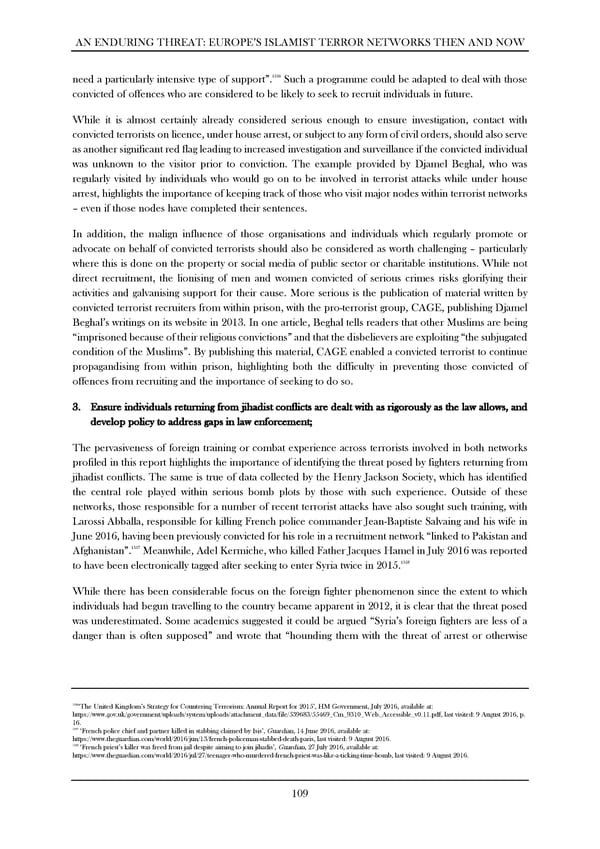AN ENDURING THREAT: EUROPE’S ISLAMIST TERROR NETWORKS THEN AND NOW 1356 need a particularly intensive type of support”. Such a programme could be adapted to deal with those convicted of offences who are considered to be likely to seek to recruit individuals in future. While it is almost certainly already considered serious enough to ensure investigation, contact with convicted terrorists on licence, under house arrest, or subject to any form of civil orders, should also serve as another significant red flag leading to increased investigation and surveillance if the convicted individual was unknown to the visitor prior to conviction. The example provided by Djamel Beghal, who was regularly visited by individuals who would go on to be involved in terrorist attacks while under house arrest, highlights the importance of keeping track of those who visit major nodes within terrorist networks – even if those nodes have completed their sentences. In addition, the malign influence of those organisations and individuals which regularly promote or advocate on behalf of convicted terrorists should also be considered as worth challenging – particularly where this is done on the property or social media of public sector or charitable institutions. While not direct recruitment, the lionising of men and women convicted of serious crimes risks glorifying their activities and galvanising support for their cause. More serious is the publication of material written by convicted terrorist recruiters from within prison, with the pro-terrorist group, CAGE, publishing Djamel Beghal’s writings on its website in 2013. In one article, Beghal tells readers that other Muslims are being “imprisoned because of their religious convictions” and that the disbelievers are exploiting “the subjugated condition of the Muslims”. By publishing this material, CAGE enabled a convicted terrorist to continue propagandising from within prison, highlighting both the difficulty in preventing those convicted of offences from recruiting and the importance of seeking to do so. 3. Ensure individuals returning from jihadist conflicts are dealt with as rigorously as the law allows, and ! develop policy to address gaps in law enforcement; The pervasiveness of foreign training or combat experience across terrorists involved in both networks profiled in this report highlights the importance of identifying the threat posed by fighters returning from jihadist conflicts. The same is true of data collected by the Henry Jackson Society, which has identified the central role played within serious bomb plots by those with such experience. Outside of these networks, those responsible for a number of recent terrorist attacks have also sought such training, with Larossi Abballa, responsible for killing French police commander Jean-Baptiste Salvaing and his wife in June 2016, having been previously convicted for his role in a recruitment network “linked to Pakistan and 1357 Afghanistan”. Meanwhile, Adel Kermiche, who killed Father Jacques Hamel in July 2016 was reported 1358 to have been electronically tagged after seeking to enter Syria twice in 2015. While there has been considerable focus on the foreign fighter phenomenon since the extent to which individuals had begun travelling to the country became apparent in 2012, it is clear that the threat posed was underestimated. Some academics suggested it could be argued “Syria’s foreign fighters are less of a danger than is often supposed” and wrote that “hounding them with the threat of arrest or otherwise ! ! 1356‘The United Kingdom’s Strategy for Countering Terrorism: Annual Report for 2015’, HM Government, July 2016, available at: https://www.gov.uk/government/uploads/system/uploads/attachment_data/file/539683/55469_Cm_9310_Web_Accessible_v0.11.pdf, last visited: 9 August 2016, p. 16. 1357 ‘French police chief and partner killed in stabbing claimed by Isis’, Guardian, 14 June 2016, available at: https://www.theguardian.com/world/2016/jun/13/french-policeman-stabbed-death-paris, last visited: 9 August 2016. 1358 ‘French priest’s killer was freed from jail despite aiming to join jihadis’, Guardian, 27 July 2016, available at: https://www.theguardian.com/world/2016/jul/27/teenager-who-murdered-french-priest-was-like-a-ticking-time-bomb, last visited: 9 August 2016. ! ! 109 !
 An Enduring Threat: Europe’s Islamist Terror Networks Then and Now Page 114 Page 116
An Enduring Threat: Europe’s Islamist Terror Networks Then and Now Page 114 Page 116